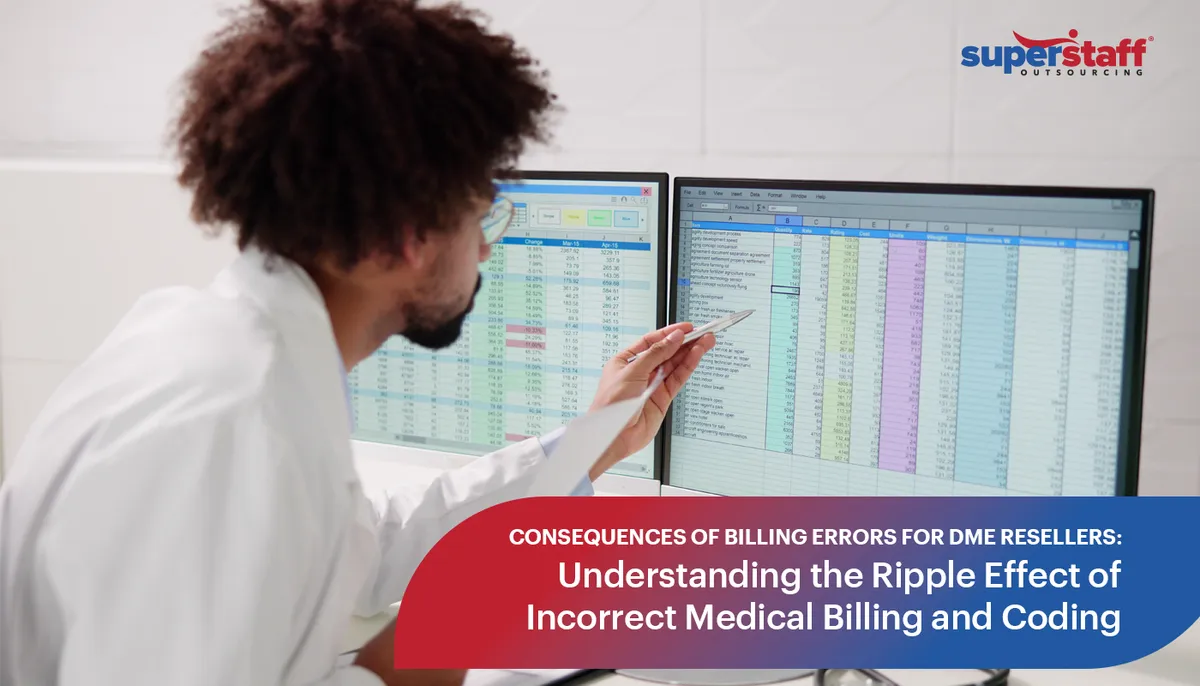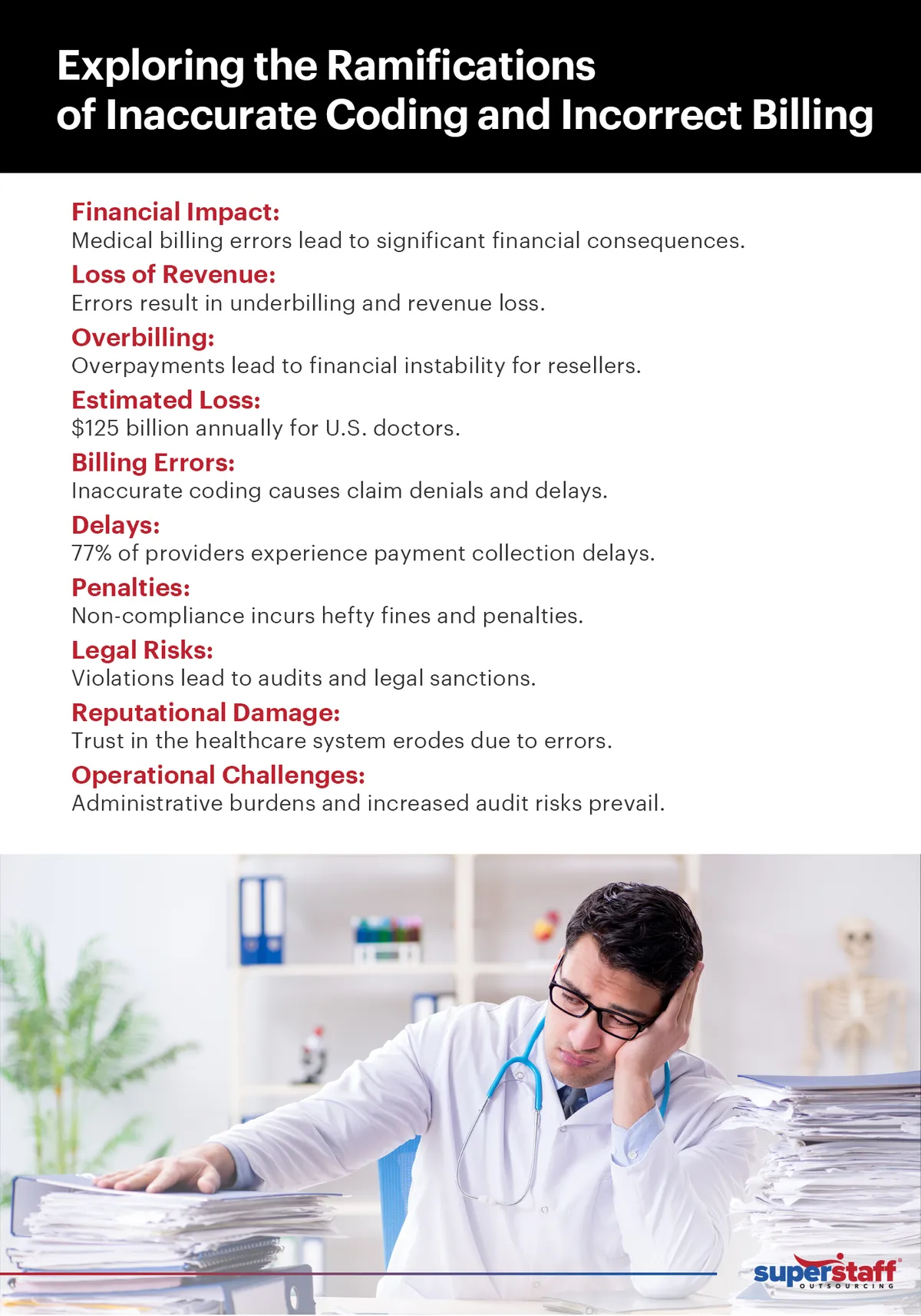
Medical billing and coding is the lifeblood that finances the critical life-or-death health care sector. When errors happen in these processes, the consequences can trickle far beyond the initial mistake — and this is most evident in Durable Medical Equipment (DME) resellers.
DME businesses play a vital role in providing essential equipment to patients, but they are not immune to the impacts of incorrect billing and coding. One simple coding error in this sector could lead to severe financial, legal and medical repercussions. Let’s take a deep dive into this issue and shed light on the profound consequences they pose to DME resellers as well as the broader healthcare landscape.
What is Medical Billing and Coding?
From ensuring compliance with regulatory standards to optimizing revenue cycles, the stakes are high when it comes to medical coding and billing. But what exactly are these processes and why do they matter?
Medical billing and coding encompass the processes of translating medical procedures, diagnoses, and treatments into universal codes for billing and reimbursement purposes. These codes, such as CPT codes, form the backbone of the revenue cycle, dictating the flow of payments between healthcare providers and insurance companies.
The Costly Terrain of Medical Billing Errors: What Are the Consequences of Inaccurate Coding and Incorrect Billing
Despite medical coders’ best efforts, billing errors have become an all-too-common occurrence. It’s reported that a staggering 80% of medical bills contain mistakes, a figure that experts believe is on the rise. Going beyond mere inconveniences, the ripple effect of these mistakes impact patients’ finances, healthcare providers’ revenue streams, and the overall integrity of the healthcare system.
At the heart of the issue lies the complexity of medical billing codes and procedures. With thousands of codes to navigate and constant updates to regulations, there is a huge margin for error. Whether it’s a simple coding mistake or a more egregious billing error, the consequences can be severe.

Financial Impact
The financial impact of medical billing errors cannot be overstated. From loss of revenue and reimbursement delays to penalties and fines, these errors can have far-reaching consequences for DME resellers. In the U.S. healthcare system alone, medical billing errors contribute to staggering losses of up to $935 million per week.
Loss of Revenue
Medical billing errors often result in underbilling, meaning that healthcare providers fail to bill for the full amount of DMEs. Over time, this can lead to significant revenue losses as resellers struggle to charge the true value of their DME products.
On the flip side, overbilling is just as bad, leading to reimbursement clawbacks when payers identify and recoup overpayments. Both scenarios can erode financial stability and hinder the ability of resellers to reinvest in resources and services.
These poor billing practices contribute to an estimated annual loss of $125 billion for doctors in the U.S. alone.
Billing Errors and Reimbursement Delays
Inaccurate coding often leads to claim denials or rejections by insurance payers. In turn, these denials usually result in delays in reimbursement, as healthcare providers struggle to navigate appeals processes or resubmit corrected claims.
According to Healthleaders Media, a staggering 77% of providers report that payment collection often takes more than a month. These delays strain cash flow, disrupt business operations, and impede the ability to provide timely care to patients. Furthermore, prolonged reimbursement delays can create additional administrative burdens and increase the risk of financial instability for healthcare organizations.
Penalties and Fines
Compliance with billing regulations is essential for healthcare organizations, as failure to do so can result in hefty penalties and fines. Whether due to unintentional errors or fraudulent practices, the financial repercussions of non-compliance can be severe.
Regulatory bodies and insurance payers may impose fines for billing errors, and in cases of fraud, criminal penalties may apply. These penalties pose immediate financial burdens and jeopardize the long-term financial viability as well as reputation of healthcare organizations.
Legal and Compliance Risks
To avoid legal risks, DME resellers must also prioritize compliance with Medicare, Medicaid, and other relevant regulations to avoid legal and regulatory risks associated with medical billing errors.
Violation of Medicare and Medicaid Regulations
Medical billing errors can inadvertently lead to violations of Medicare and Medicaid regulations, which govern reimbursement for healthcare services provided to eligible beneficiaries.
When violations such as incorrect coding and improper documentation are flagged, regulatory bodies may initiate audits or investigations to assess the extent of non-compliance. Depending on the severity of the violations, healthcare providers and DME resellers may face legal sanctions, repayment obligations, or exclusion from participation in Medicare and Medicaid programs.
Legal Consequences: False Claims Act and Anti-Kickback Statute
Medical billing errors can also expose DME resellers to legal consequences under federal laws such as the False Claims Act (FCA) and the Anti-Kickback Statute (AKS). The FCA prohibits the submission of false or fraudulent claims for reimbursement to government healthcare programs, including Medicare and Medicaid. Resellers found liable under the FCA may face civil monetary penalties, treble damages, and exclusion from federal healthcare programs.
Similarly, the AKS prohibits the exchange of remuneration in exchange for referrals or the generation of federal healthcare program business. AKS violations can result in civil and criminal penalties, including fines and imprisonment.
Ultimately, the legal ramifications of non-compliance with these laws can be severe, tarnishing the reputation of the organization and its stakeholders and potentially leading to financial ruin.
Reputational Damage
Beyond the financial and legal implications, billing errors can inflict lasting damage to the reputation of DME resellers. Inaccurate or fraudulent billing practices undermine trust and confidence in the integrity of the healthcare system, eroding patient loyalty and community trust.
Repeated billing inaccuracies can damage the reputation of healthcare providers, leading to negative publicity, loss of business, and diminished patient referrals.
Operational Challenges
The operational challenges posed by medical billing errors are just as damaging.
DME resellers must proactively address these challenges by investing in efficient billing processes, robust compliance programs, and ongoing staff training.
Administrative Burden
From resolving claim disputes and responding to audits to implementing corrective measures, dealing with the aftermath of billing errors puts a massive administrative burden on DME resellers.
The time and effort spent on administrative tasks related to billing errors divert valuable resources away from patient care, hindering the organization’s ability to focus on its core mission of providing quality healthcare services.
Increased Audit Risk
Inaccurate billing practices increase the risk of audits by regulatory bodies and insurance providers. These audits not only disrupt day-to-day operations but also require healthcare organizations to invest additional resources in meticulous record-keeping and compliance efforts.
Audits also add another layer of complexity and uncertainty to already burdened administrative processes, further straining the organization’s operational capacity and resources.
Impact on Customer Relationships
Billing errors can strain relationships with patients and healthcare providers, undermining trust and confidence in the organization. Patients may feel frustrated and distrustful when faced with unexpected charges or billing discrepancies, leading to dissatisfaction and potential loss of loyalty.
Moreover, healthcare providers risk losing valuable referrals and partnerships due to billing errors, as inaccuracies may reflect poorly on their professionalism and reliability. The negative impact of billing errors on customer relationships can erode patient satisfaction, impede provider collaboration, and ultimately harm the organization’s reputation and business growth.
The prevalence of medical billing errors underscores the need for proactive measures to mitigate their impact. Ultimately, by prioritizing accuracy and compliance, stakeholders can uphold the integrity of the healthcare system and ensure the delivery of high-quality care to patients.
Strategies for Ensuring Accuracy in Medical Billing and Coding

The consequences of inaccurate coding and incorrect billing can be severe. Denied claims, delayed reimbursements, and financial penalties can disrupt operations and jeopardize the financial health of medical practices. Therefore, mastering accuracy in medical billing and coding is essential for ensuring smooth operations and maximizing revenue.
Here are some key strategies to achieve accuracy and efficiency in medical billing and coding.
Implement Robust Compliance Programs
Establishing comprehensive compliance programs helps ensure adherence to regulatory requirements and industry standards. This includes regular training for medical billers and coders to stay updated on changes in coding guidelines and regulations.
Utilize Technology Solutions
Health tech adoption surged during the pandemic and has now become non-negotiable, with telehealth usage skyrocketing to 38 times its pre-COVID-19 levels. To navigate this new landscape effectively, healthcare providers must leverage advanced technology solutions, including billing software and electronic health record systems, to streamline coding processes and mitigate errors.
Automation offers the potential to enhance efficiency and accuracy while minimizing the risk of human error, ensuring that healthcare delivery remains reliable and effective in the face of ongoing challenges.
Conduct Regular Audits and Reviews
Regular audits of coding and billing practices can help identify discrepancies and areas for improvement. By conducting thorough reviews of medical records and billing documents, medical practices can proactively address issues before they escalate.
Outsourcing a Team of DME Billing, Coding & Collections Ticket Reviewers
Outsourcing medical billing and coding, as well as other non-core specialty healthcare tasks to experienced professionals can provide valuable support and expertise. Online medical billing and coding professionals can offer specialized knowledge and resources to ensure accurate coding and maximize revenue.
By prioritizing accuracy and implementing these strategies, medical practices can navigate the complexities of medical billing and coding with confidence. With a strong focus on compliance, technology, and continuous improvement, an outsourced medical and coder team can help DME resellers optimize revenue cycles and deliver quality care to patients.
Mitigate Risks and Ensure Compliance in Medical Coding and Billing
As a seasoned player in the healthcare sector with over a decade of experience, Superstaff brings a wealth of expertise to the table. Backed by our parent company, a renowned leader in dental technology, we understand the intricate workings of the healthcare industry.
Our mission is to help healthcare providers mitigate risks and ensure compliance in medical billing and coding. With our specialized knowledge and advanced technology solutions, we empower organizations to navigate the complexities of medical billing with confidence and precision.






